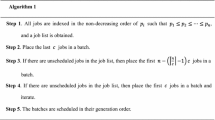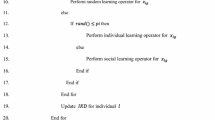Abstract
This paper addresses a serial-batching scheduling problem where the jobs with arbitrary release times are scheduled on parallel machines with the objective to minimize the makespan. The effects of learning and deterioration are considered simultaneously, and each job’s actual processing time depends on the sum of previous jobs’ processing times and the position of the current job. Each machine can process up to \( c \) jobs in the manner of serial batch, i.e., one after another with a setup time for each batch. Structural properties are identified for the special cases of the studied problem. Based on these derived structural properties, we propose a novel hybrid SC-VNS algorithm to solve the studied problem, which combines Society and Civilization (SC) algorithm with Variable Neighborhood Search (VNS). Computational experiments are conducted to evaluate the performance of the proposed hybrid algorithm and some other well-known algorithms. The results demonstrate that the proposed hybrid SC-VNS algorithm performs quite better than the compared algorithms in terms of the solution quality and the required running time.















Similar content being viewed by others
References
Arroyo, J. E. C., & Leung, J. Y. T. (2017). Scheduling unrelated parallel batching processing machines with non-identical job sizes and unequal ready times. Computers & Operations Research, 78, 117–128.
Biskup, D. (1999). Single-machine scheduling with learning considerations. European Journal of Operational Research, 115(1), 173–178.
Browne, S., & Yechiali, U. (1990). Scheduling deteriorating jobs on a single processor. Operations Research, 38(3), 495–498.
Chen, Z.-L. (1995). A note on single-processor scheduling with time-dependent execution times. Operations Research Letters, 17(3), 127–129.
Cheng, T. C. E., & Ding, Q. (1998). The complexity of scheduling starting time dependent tasks with release times. Information Processing Letters, 65(2), 75–79.
Cheng, T. C. E., Ding, Q., Kovalyov, M. Y., Bachman, A., & Janiak, A. (2003). Scheduling jobs with piecewise linear decreasing processing times. Naval Research Logistics, 50(6), 531–554.
Cheng, T. C. E., & Wang, G. (2000). Single machine scheduling with learning effect consideration. Annals of Operations Research, 98, 273–290.
Cheng, T. C. E., Wu, C. C., & Lee, W.-C. (2008). Some scheduling problems with deteriorating jobs and learning effects. Computers & Industrial Engineering, 54(40), 972–982.
Croce, F. D., Garaix, T., & Grosso, A. (2012). Iterated local search and very large neighborhoods for the parallel-machines total tardiness problem. Computers & Operations Research, 39(6), 1213–1217.
Fan, W., Pei, J., Liu, X., Pardalos, P. M., & Kong, M. (2018). Serial-batching group scheduling with release times and the combined effects of deterioration and truncated job-dependent learning. Journal of Global Optimization, 71(1), 147–163.
Graham, R. L., Lawler, E. L., Lenstra, J. K., & Rinnooy Kan, A. H. G. (1979). Optimization and approximation in deterministic sequencing and scheduling: A survey. Annals of Descrete Mathematics, 5, 287–326.
Gupta, J. N. D., & Gupta, S. K. (1988). Single facility scheduling with nonlinear processing times. Computers & Industrial Engineering, 14(4), 387–393.
Hansen, P., Mladenovic, N., & Perez, J. A. M. (2010). Variable neighborhood search: methods and applications. Annals of Operations Research, 175(1), 367–407.
Huang, X., & Wang, M.-Z. (2011). Parallel identical machines scheduling with deteriorating jobs and total absolute differences penalties. Applied Mathematical Modelling, 35(3), 1349–1353.
Hulett, M., Damodaran, P., & Amouie, M. (2017). Scheduling non-identical parallel batch processing machines to minimize total weighted tardiness using particle swarm optimization. Computers & Industrial Engineering, 113, 425–436.
Jiang, L., Pei, J., Liu, X., Pardalos, P. M., & Qian, X. (2016). Uniform parallel batch machines scheduling considering transportation using a hybrid DPSO-GA algorithm. International Journal of Advanced Manufacturing Technology, 89, 1887–1900.
Kumar, A., & Tan, Y. (2015). The demand effects of joint product advertising in online videos. Management Science, 61, 1921–1937.
Lee, C. Y. (1999). Minimizing makespan on a single batch processing machine with dynamic job arrivals. International Journal of Production Research, 37(1), 219–236.
Lee, W.-C. (2004). A note on deteriorating jobs and learning in single-machine scheduling problems. International Journal of Business and Economics, 3(1), 83.
Leung, J. Y. T., Ng, C. T., & Cheng, T. C. E. (2008). Minimizing sum of completion times for batch scheduling of jobs with deteriorating processing times. European Journal of Operational Research, 187(3), 1090–1099.
Li, M., Sethi, S. P., & Zhang, J. (2016). Competing with bandit supply chains. Annals of Operations Research, 240(2), 617–640.
Li, M., & Zhang, J. (2012). Does inventory pooling improve customer service level? Operations Research Letters, 40(2), 96–98.
Li, S., Li, G., & Zhang, S. (2005). Minimizing makespan with release times on identical parallel batching machines. Discrete Applied Mathematics, 148(1), 127–134.
Liang, Z., Feng, Y., Zhang, X., Tao, W., & Chaovalitwongse, W. A. (2015). Robust weekly aircraft maintenance routing problem and the extension to the tail assignment problem. Transportation Research Part B: Methodological, 78, 238–259.
Liao, L. W., & Sheen, G. J. (2008). Parallel machine scheduling with machine availability and eligibility constraints. European Journal of Operational Research, 184(2), 458–467.
Liu, X., Shaojun, L., Pei, J., & Pardalos, P. M. (2018). A hybrid VNS-HS algorithm for a supply chain scheduling problem with deteriorating jobs. International Journal of Production Research, 56(17), 5758–5775.
Luo, H., Huang, G. Q., Zhang, Y. F., & Dai, Q. Y. (2011). Hybrid flowshop scheduling with batch-discrete processors and machine maintenance in time windows. International Journal of Production Research, 49(6), 1575–1603.
Mosheiov, G. (2001). Parallel machine scheduling with learning effect. Journal of the Operational Research Society, 52(10), 1165–1169.
Pan, Q. K., Tasgetiren, M. F., & Liang, Y. C. (2011). A discrete particle swarm optimization algorithm for the no-wait flowshop scheduling problem. Computers & Operations Research, 35(9), 2807–2839.
Pan, Y., & Liang, Z. (2017). Dual relaxations of the time-indexed ILP formulation for min-sum scheduling problems. Annals of Operations Research, 249(1–2), 197–213.
Pei, J., Cheng, B., Liu, X., Pardalos, P. M., & Kong, M. (2019a). Single-machine and parallel-machine serial-batching scheduling problems with position-based learning effect and linear setup time. Annals of Operations Research, 272(1–2), 217–241.
Pei, J., Liu, X., Fan, W., Pardalos, P. M., Migdalas, A., Goldengorin, B., et al. (2016a). Minimizing the makespan for a serial-batching scheduling problem with arbitrary machine breakdown and dynamic job arrival. International Journal of Advanced Manufacturing Technology, 86(9), 3315–3331.
Pei, J., Liu, X., Fan, W., Pardalos, P. M., Migdalas, A., & Yang, S. (2016b). Scheduling jobs on a single serial-batching machine with dynamic job arrivals and multiple job types. Annals of Mathematics and Artificial Intelligence, 76, 215–228.
Pei, J., Liu, X., Fan, W., Pardalos, P. M., & Shaojun, L. (2019b). A hybrid BA-VNS algorithm for coordinated serial-batching scheduling with deteriorating jobs, financial budget, and resource constraint in multiple manufacturers. Omega, 82, 55–69.
Pei, J., Liu, X., Liao, B., Pardalos, P. M., & Kong, M. (2018). Single-machine scheduling with learning effect and resource-dependent processing times in the serial-batching production. Applied Mathematical Modelling, 58, 245–253.
Pei, J., Liu, X., Pardalos, P. M., Fan, W., Wang, L., & Yang, S. (2016c). Solving a supply chain scheduling problem with non-identical job sizes and release times by applying a novel effective heuristic algorithm. International Journal of System Science, 47(4), 765–766.
Pei, J., Liu, X., Pardalos, P. M., Fan, W., & Yang, S. (2015a). Single machine serial-batching scheduling with independent setup time and deteriorating job processing times. Optimization Letters, 9(1), 91–104.
Pei, J., Liu, X., Pardalos, P. M., Fan, W., & Yang, S. (2017a). Scheduling deteriorating jobs on a single serial-batching machine with multiple job types and sequence-dependent setup times. Annals of Operations Research, 249(1–2), 175–195.
Pei, J., Liu, X., Pardalos, P. M., Fan, W., Yang, S., & Wang, L. (2014). Application of an effective modified gravitational search algorithm for the coordinated scheduling problem in a two-stage supply chain. International Journal of Advanced Manufacturing Technology, 70(1–4), 335–348.
Pei, J., Liu, X., Pardalos, P. M., Li, K., Fan, W., & Migdalas, A. (2017b). Single-machine serial-batching scheduling with a machine availability constraint, position-dependent processing time, and time-dependent set-up time. Optimization Letters, 11(7), 1257–1271.
Pei, J., Liu, X., Pardalos, P. M., Migdalas, A., & Yang, S. (2017c). Serial-batching scheduling with time-dependent setup time and effects of deterioration and learning on a single-machine. Journal of Global Optimization, 67(1), 251–262.
Pei, J., Pardalos, P. M., Liu, X., Fan, W., & Yang, S. (2015b). Serial batching scheduling of deteriorating jobs in a two-stage supply chain to minimize the makespan. European Journal of Operational Research, 244(1), 13–25.
Ray, T., & Liew, K. M. (2003). Society and civilization: An optimization algorithm based on the simulation of social behavior. IEEE Transactions on Evolutionary Computation, 7(4), 386–396.
Rostami, M., Pilerood, A. E., & Mazdeh, M. M. (2015). Multi-objective parallel machine scheduling problem with job deterioration and learning effect under fuzzy environment. Computers & Industrial Engineering, 85, 206–215.
Rudek, R. (2013). On single processor scheduling problems with learning dependent on the number of processed jobs. Applied Mathematical Modelling, 37, 1523–1536.
Storn, R., & Price, K. (2011). Differential evolution—A simple and efficient heuristic for global optimization over continuous spaces. Journal of Global Optimization, 11(4), 341–359.
Sun, L. (2009). Single-machine scheduling problems with deteriorating jobs and learning effects. Computers & Industrial Engineering, 57(3), 843–846.
Sundararaghavan, P. S., & Kunnathur, A. S. (1994). Single machine scheduling with start time dependent processing time: Some solvable cases. European Journal of Operational Research, 78(3), 394–403.
Teyarachakul, S., Chand, S., & Ward, J. (2011). Effect of learning and forgetting on batch size. Production and Operations Management, 20(1), 116–128.
Toksari, M. D. (2011). A branch and bound algorithm for minimizing makespan on a single machine with unequal release times under learning effect and deteriorating jobs. Computers & Operations Research, 38(9), 1361–1365.
Wright, T. P. (1936). Factors affecting the cost of airplanes. Journal of the Aeronautical Sciences, 3(4), 122–128.
Wu, C. C., Hsu, P.-H., Chen, J.-C., & Wang, N.-S. (2011). Genetic algorithm for minimizing the total weighted completion time scheduling problem with learning and release times. Computers & Operations Research, 38(7), 1025–1034.
Wu, C. C., Wu, W. H., Wu, W. H., Hsu, P.-H., Yin, Y., & Jianyou, X. (2014). A single-machine scheduling with a truncated linear deterioration and ready times. Information Sciences, 256, 109–125.
Xu, J., Wu, C. C., Yin, Y., Zhao, C., Chiou, Y.-T., & Lin, W.-C. (2016). An order scheduling problem with position-based learning effect. Computers & Operations Research, 74, 175–186.
Yang, D.-L., & Kuo, W.-H. (2009). A single-machine scheduling problem with learning effect in intermittent batch production. Computers & Industrial Engineering, 57(3), 762–765.
Yang-Kuel, L., & Chi-Wei, L. (2013). Dispatching rules for unrelated parallel machine scheduling with release dates. International Journal of Advanced Manufacturing Technology, 67(1–4), 269–279.
Yusriski, R., Sukoyo, T. M., & Hakim, A. H. (2013). Batch scheduling for a single machine with learning effect to minimize total actual flow time. In The 14th Asia pacific industrial engineering and management system conference, Cebu, Philippines, 3–6 December.
Acknowledgements
This work is supported by the National Natural Science Foundation of China (Nos. 71922009, 71871080, 71601065, 71690235, 71690230), and Innovative Research Groups of the National Natural Science Foundation of China (71521001), the Humanities and Social Sciences Foundation of the Chinese Ministry of Education (No. 15YJC630097), Base of Introducing Talents of Discipline to Universities for Optimization and Decision-making in the Manufacturing Process of Complex Product (111 project), the Project of Key Research Institute of Humanities and Social Science in University of Anhui Province, Open Research Fund Program of Key Laboratory of Process Optimization and Intelligent Decision-making and Ministry of Education Engineering Research Center for Intelligent Decision-making and Information Systems Technologies (Hefei University of Technology), Ministry of Education.
Author information
Authors and Affiliations
Corresponding author
Additional information
Publisher's Note
Springer Nature remains neutral with regard to jurisdictional claims in published maps and institutional affiliations.
Rights and permissions
About this article
Cite this article
Pei, J., Song, Q., Liao, B. et al. Parallel-machine serial-batching scheduling with release times under the effects of position-dependent learning and time-dependent deterioration. Ann Oper Res 298, 407–444 (2021). https://doi.org/10.1007/s10479-020-03555-2
Published:
Issue Date:
DOI: https://doi.org/10.1007/s10479-020-03555-2




